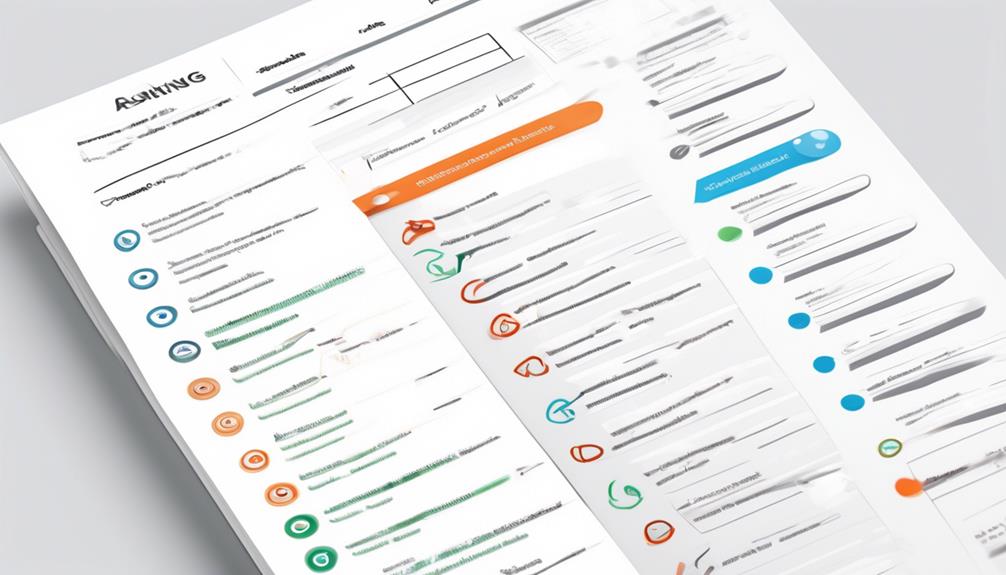Navigating the complex digital landscape as a Software Quality Assurance Engineer is like embarking on an exciting adventure, where success hinges on strategic choices and meticulous execution.
From mastering a programming language to honing essential soft skills, the road to becoming a QA Engineer is multifaceted and demands meticulous attention to detail.
But fear not, for we have compiled a comprehensive guide to help you navigate this terrain and emerge as a proficient and sought-after professional in the world of software quality assurance.
Key Takeaways
- Strong understanding of programming languages and software development methodologies is necessary for a Software Quality Assurance Engineer.
- Proficiency in manual and automated testing tools and frameworks is essential for effective software testing.
- Acquiring practical experience through internships and hands-on skills is crucial for excelling as a QA engineer.
- Obtaining professional certifications and building a portfolio showcasing successful testing scenarios and bug reports can enhance career prospects in software quality assurance.
Necessary Skills and Qualifications
We require a strong understanding of various programming languages, including Java, C#, Python, or others, for the role of a Software Quality Assurance Engineer.
As a Software Quality Assurance Engineer, a deep comprehension of software development and testing methodologies is essential. Proficiency in manual and automated testing tools and frameworks is a critical aspect of the role.
Additionally, a solid knowledge of the Software Development Life Cycle (SDLC) and development methodologies is imperative for success in this career. Excellent communication and collaboration skills are also necessary for effective interaction with development teams and stakeholders.
To excel in the field of Software Quality Assurance, a degree in computer science or a related field is often required. Furthermore, obtaining certifications such as Certified Software Quality Engineer (CSQE) can significantly enhance one’s credentials and career prospects.
A comprehensive understanding of automation tools and their application in the QA process is also crucial. With these qualifications and skills, a Software Quality Assurance Engineer can effectively contribute to the development of high-quality and reliable software systems.
Practical Experience and Internships

Transitioning from the necessary skills and qualifications, practical experience and internships play a pivotal role in gaining hands-on skills and applying theoretical knowledge in real-world scenarios for aspiring Software Quality Assurance Engineers.
Internships and entry-level positions offer valuable opportunities to immerse oneself in the practical aspects of software quality assurance. Through internships, individuals can gain exposure to testing processes, explore various programming languages, and understand the development process within a real-world context. These experiences provide a platform to apply theoretical knowledge to actual projects, enhancing one’s understanding of industry best practices and tools utilized in software quality assurance.
Working under the guidance of experienced professionals during internships allows individuals to learn from their expertise and gain insights into the day-to-day responsibilities of QA engineers. It’s during these internships that individuals can test their skills, gain experience in real-world testing scenarios, and acquire the necessary hands-on experience to excel as Software Quality Assurance Engineers.
Therefore, actively seeking internship opportunities and entry-level positions is crucial for those looking to transition theoretical knowledge into practical expertise within the field of software quality assurance.
Professional Certification and Portfolio

Professional certification in software quality assurance provides a tangible demonstration of expertise and proficiency in the field. It’s essential for software quality assurance engineers to obtain professional certification to validate their skills and knowledge. Seek certification in popular quality assurance methodologies such as Six Sigma or Agile to showcase a comprehensive understanding of industry best practices. Join professional organizations related to software quality assurance to stay updated with the latest trends and network with industry professionals.
Building a portfolio is also crucial when pursuing professional certification and showcasing your skills. Include examples of successful software testing scenarios and bug reports in your portfolio to highlight your technical skills and attention to detail. Additionally, showcase your projects, test plans, and quality assurance strategies to demonstrate your ability to ensure the quality of software products. By having a strong portfolio, you can effectively demonstrate your expertise and increase your chances of career advancement in the field.
Job Search and Technical Interview Preparation

As we pivot our focus to the job search and technical interview preparation, it’s crucial to research and apply to companies that prioritize software quality assurance and testing roles.
When looking for positions as software quality assurance engineers, having a computer degree and knowledge of testing tools like Selenium can be advantageous. It’s important to showcase your understanding of both manual testing and automated tests, as well as your ability to write test cases during technical interviews.
Additionally, preparing for technical interviews should involve practicing coding problems, understanding testing methodologies, and familiarizing yourself with common quality assurance tools and practices. Networking with professionals in the quality assurance and software testing field can provide valuable insights and help refine your interview preparation.
During technical interviews, demonstrating problem-solving skills, attention to detail, and the ability to work within teams can impress potential employers.
Job search and technical interview preparation require a methodical and analytical approach to ensure readiness for the demands of the software testing industry.
Essential Soft Skills
Developing essential soft skills is crucial for software quality assurance engineers to effectively collaborate with development teams and stakeholders. Spotting and documenting bugs, meeting strict deadlines, addressing software issues, and balancing multiple tasks in a fast-paced development environment are all important aspects of the job.
As quality assurance engineers, we must possess strong communication skills to interact with various teams and stakeholders. This ensures that everyone is aligned on project goals and requirements. Exceptional attention to detail is necessary for meticulously spotting and documenting bugs and issues, ensuring the delivery of high-quality products.
Additionally, patience and perseverance are essential traits for meeting strict deadlines and addressing complex problems that may arise during product development. Good problem-solving skills are crucial for effectively addressing software issues and continuously improving quality standards.
Finally, effective time management skills are vital for balancing multiple tasks and responsibilities in a fast-paced environment. This ensures that all aspects of manual and automated testing are covered thoroughly.
These essential soft skills are paramount for success in the field of software quality assurance engineering.
Frequently Asked Questions
How Long Does It Take to Become a Software Quality Assurance Engineer?
It takes time to become a software quality assurance engineer.
We need to pursue a bachelor’s degree in computer science or a related field, gain practical experience through internships or entry-level positions, and consider obtaining relevant certifications.
Continuous learning through online courses, workshops, and industry publications is essential.
Additionally, enhancing communication skills for collaboration with development teams and stakeholders is crucial.
These steps collectively contribute to the development of a well-rounded software quality assurance engineer.
How Do I Start a Career in Software Quality Assurance?
We start a career in software quality assurance by specializing in a programming language and pursuing specialized training in coding and software development.
We gain practical experience through internships or entry-level positions and continuously refine our technical skills.
We also develop strong communication skills, seek professional certifications, and stay informed about the latest trends in the industry.
Continuous learning, collaboration with development teams, and networking with industry professionals are essential for success.
What Qualification Is Needed for a QA Engineer?
To become a Software Quality Assurance Engineer, a bachelor’s degree in computer science or a related field is often preferred by employers. Practical experience through internships or entry-level positions is valuable.
Strong communication skills and the ability to work well with different groups are essential. Obtaining relevant certifications can enhance professional credibility.
Staying informed about the latest trends and advancements in software quality assurance through continuous learning and professional development is crucial.
How Do I Start Working as a QA Engineer?
We start working as a QA engineer by gaining a strong foundation in computer science and specializing in a programming language like Java, C#, or Python.
Seeking internships or entry-level positions in QA helps gain practical experience.
Developing skills in software testing and quality assurance, continuously refining technical skills, and obtaining professional certifications enhances professional credibility.
It’s essential to stay updated with the latest industry trends and best practices.
Conclusion
In conclusion, becoming a Software Quality Assurance Engineer is like building a sturdy foundation for a skyscraper. It requires a strong base of technical skills, reinforced with practical experience and professional certification.
Just like a skyscraper requires attention to detail and precision, so does the role of a QA Engineer. By continuously honing our skills and staying up to date with industry practices, we can ensure the software we test is as solid as a well-built skyscraper.









